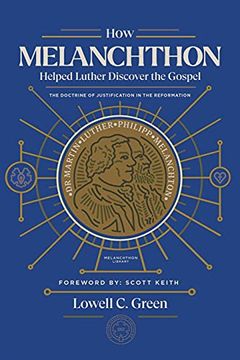Compartir
How Melanchthon Helped Luther Discover the Gospel: The Doctrine of Justification in the Reformation (en Inglés)
Lowell Green
(Autor)
·
Scott Keith
(Prefacio de)
·
1517 Publishing
· Tapa Blanda
How Melanchthon Helped Luther Discover the Gospel: The Doctrine of Justification in the Reformation (en Inglés) - Green, Lowell ; Keith, Scott
S/ 88,71
S/ 177,43
Ahorras: S/ 88,71
Elige la lista en la que quieres agregar tu producto o crea una nueva lista
✓ Producto agregado correctamente a la lista de deseos.
Ir a Mis Listas
Origen: Estados Unidos
(Costos de importación incluídos en el precio)
Se enviará desde nuestra bodega entre el
Viernes 17 de Mayo y el
Viernes 31 de Mayo.
Lo recibirás en cualquier lugar de Perú entre 2 y 5 días hábiles luego del envío.
Reseña del libro "How Melanchthon Helped Luther Discover the Gospel: The Doctrine of Justification in the Reformation (en Inglés)"
This book is not claiming Melanchthon rediscovered the gospel. That honor belongs to his friend and mentor, Martin Luther. Nevertheless, Dr. Lowell C. Green argues that Melanchthon helped Luther in the task. Dr. Green knew that in choosing the title, How Melanchthon Helped Luther Discover the Gospel, he risked arousing the prejudice of those who look on Melanchthon with suspicion. Green is not blind to Melanchthon's faults; at times, he is critical of him. But, he debunks the myth that when Melanchthon came to Wittenberg in 1518, Luther had already developed his Reformational doctrine. Green shows that Melanchthon brought the tools of humanism to the aid of the emerging agitation. Although maintaining a subordinate role to Luther, Melanchthon helped him repeatedly at the turning points of the Reformation.Green asserts that Melanchthon was the first to speak of the authority of the Bible over the church. In his Baccalaureate Theses of 1519, Melanchthon became the first to articulate the forensic nature of justification. Most surprisingly, Melanchthon helped Luther move from the medieval view of faith as credulitas or adhaesio (adherence) to the Reformational view of faith as fiducia (trust) and assurance of salvation. Luther testified that he learned this from Melanchthon in 1518.As late as 1519, Luther had not yet abandoned the medieval view of grace as an infused substance. Melanchthon again led the way in 1520 when he declared that grace was simply the attitude of God-His favor. In his 1521 Loci Communes Melanchthon not only pointed out that grace is not something in us, but he made the important distinction between "grace" and "the gift of grace" (the Holy Spirit). Luther generously acknowledged the brilliance of Melanchthon's Loci Communes. This and other accolades Luther showered on Melanchthon are an indication of young scholar's influence on the great reformer's central teachings.Lowell C. Green was one of America's foremost Luther scholars, and his body of work continues to inform and shape Reformation studies today. This edition of How Melanchthon Helped Luther Discover the Gospel is the fruition of more than twenty-five years of Luther studies. Dr. Green's central thrust was to challenge the "Young Luther" cult which originated in the early 1900s and gained such a stranglehold on Luther studies in the 1950s and 1960s. In this volume, Green marshals the evidence gathered over a lifetime of study, joining his voice to a choir of scholars who challenge the central thesis of the "Young Luther" movement.After thoroughly demonstrating that Luther's early works contained a medieval or Roman Catholic "analytical justification," Green traces the emergence of the Reformational doctrine and a real break with medieval theology beginning in 1519.Green amply demonstrates that the mature Luther subscribed to and frequently expressed the doctrine of justification in forensic terms so that the glory of our salvation could be ascribed wholly to Christ and for the comfort of conscience against the accusing power of the law.
- 0% (0)
- 0% (0)
- 0% (0)
- 0% (0)
- 0% (0)
Todos los libros de nuestro catálogo son Originales.
El libro está escrito en Inglés.
La encuadernación de esta edición es Tapa Blanda.
✓ Producto agregado correctamente al carro, Ir a Pagar.

